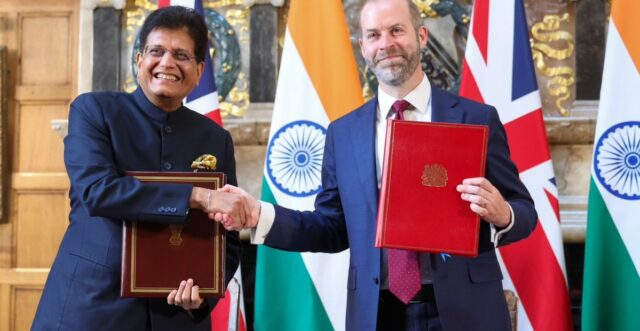
The signing of the India-UK Free Trade Agreement (FTA) has got the thumbs up across India’s business and trade sectors. Leading industry bodies have called the trade deal a landmark development poised to reshape bilateral trade, boost domestic manufacturing and unlock new avenues for Indian exporters.
The comprehensive trade deal, which aims to double India-UK trade to $120 billion by 2030 and expand it by another $40 billion by 2040, arrives at a time India is actively pursuing global trade partnerships.
The FTA is expected to deliver wide-ranging benefits across sectors such as textiles, engineering, IT, agriculture and wellness. The deal will also create pathways for collaboration in digital trade, AI and climate sustainability.
Industry Cheers Economic Boost
A “game-changer for Indian industry,” especially for sectors like textiles and leather, is how Sanjay Nayar, President, Associated Chambers of Commerce and Industry of India (ASSOCHAM), put it. “This agreement will not only enhance export potential but also support innovation-led sectors and services. It aligns closely with India’s vision of becoming a global manufacturing and knowledge hub.”
Manish Singhal, Secretary General of ASSOCHAM, highlighted the recognition of India’s cultural economy. “The inclusion of wellness and cultural sectors adds a fresh layer to trade diplomacy. ASSOCHAM stands fully aligned with the opportunities this deal presents,” he said.
From a broader strategic perspective, the FTA complements India’s recent trade outreach, following the India-EFTA agreement and ongoing talks with the EU and the United States. The reduced tariffs and simplified rules of origin are expected to bolster India’s export competitiveness.
Defining Moment, Says FICCI
The Federation of Indian Chambers of Commerce and Industry (FICCI) lauded the agreement as a defining moment in India’s trade evolution. FICCI President Harsha Vardhan Agarwal remarked: “The FTA aligns with India’s ambition of deeper global economic integration. It reinforces the Atmanirbhar Bharat agenda by helping industries scale globally and compete more effectively.”
FICCI Senior Vice President Anant Goenka noted that the pact “promises enhanced market access and long-term certainty for Indian exporters.”
Dr Anish Shah, former FICCI President, highlighted the deal’s broader implications. “This is not just a trade win—it’s a values-driven blueprint for global cooperation centred on sustainability, innovation and inclusive growth.”
Jyoti Vij, Director General of FICCI, called it “a historic milestone that will energize trade and investment flows between the two countries”. Harish Ahuja, Chairman of FICCI’s Foreign Trade Committee, said the agreement would significantly strengthen India’s labour-intensive manufacturing sectors such as apparel and textiles.
Engineering Exports Set To Surge
India’s engineering sector is also poised to benefit significantly from the FTA. According to the Engineering Export Promotion Council (EEPC) India, the UK currently accounts for over 11% of India’s engineering trade growth, but Indian exports still make up less than 2.2% of the UK’s total engineering imports.
Pankaj Chadha, Chairman of EEPC India, called the FTA a “strategic breakthrough” that could double engineering exports to the UK—reaching over $7.5 billion by 2029–30. “It opens new doors for Indian exporters, particularly MSMEs, and strengthens India’s role in global value chains,” he said.
Adhip Mitra, Executive Director of EEPC India, noted that the pact “goes beyond tariffs” and “lays the foundation for technology partnerships and sustainable growth.” High-potential segments like electric machinery, auto components and construction equipment are projected to register a CAGR of 12–20%, thanks to improved access and streamlined customs procedures.
Key Features Of FTA
• Tariff Elimination: Substantial cuts across key Indian exports, particularly in engineering goods, textiles and agriculture.
• Social Security Exemption: Indian professionals will be exempt from UK social security contributions for up to three years.
• Agricultural Boost: Inclusion of Indian millets and climate-resilient crops under favourable tariff lines.
• Cultural Promotion: Support for ayurveda, yoga and Indian music in the UK.
• Digital and IP Cooperation: Provisions to support digital trade, innovation and IP protection.




